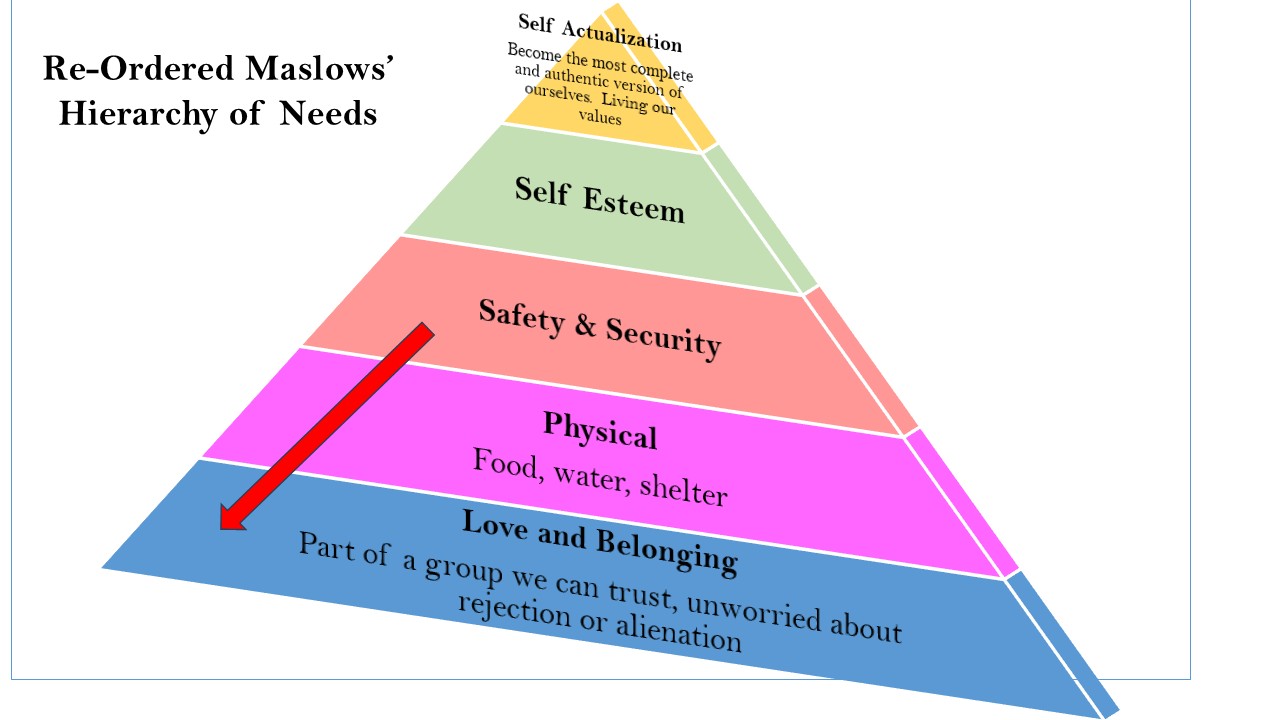The great lesson is that the sacred is in the ordinary, that it is to be found in one’s daily life, in one’s neighbors, friends, and family, in one’s backyard.
― Abraham Maslow
For decades, Maslow’s hierarchy of needs has shaped our understanding of human motivation, placing physical needs such as food and shelter at the foundation and love/belonging in the middle tier. But I’m thinking this iconic pyramid might be out of order.
We humans are fundamentally social creatures. Throughout evolution, our survival depended not just on food and shelter, but on our ability to form bonds and belong to groups, to have an identity. A baby’s first need isn’t just milk—it’s attachment and connection with caregivers. Without this emotional foundation, even well-fed infants can fail to thrive.
Modern psychology supports this shift. We all see how harmful social isolation is. People facing homelessness often cite loss of relationships as equally devastating as losing physical shelter. Meanwhile, those with strong social connections demonstrate remarkable resilience, even when basic needs aren’t fully met. We don’t see people take their own lives because they are hungry.
Perhaps wellness isn’t about climbing a pyramid from bottom to top, but about nurturing our connections first. When we feel loved and we belong, we’re more motivated to care for our physical health, pursue goals, and ultimately reach self-actualization.
The foundation of human flourishing might not be food and shelter—it might be love.
Wellbeing Ideas
The Power of Belonging
A Guide from Pain to Presence
Identifying whether emotions stem from past experiences or future anxieties transforms reactive patterns into intentional actions. This temporal awareness creates space between feeling and response, enabling grounded choices over unconscious habits. Helpful chart here
Mind the Inner Critic
Saboteurs are inner critics causing stress, anxiety, self-doubt, and unhappiness. They undermine your performance, well-being, and relationships. The first step to conquering saboteurs is identifying them and exposing their lies. Take the assessment here.
Polarized sunglasses for Hard Living
I’m brutal on sunglasses—sitting on them, slamming them in car doors, dropping them, leaving them behind, swimming in oceans and lakes (with them on). My sunglasses have a short lifespan.
Recently, expensive Oakleys met their doom when I bent over to grab my dog Bodhi. The mirror lens scratched beyond repair, reminding me of CARFIA polarized sunglasses on Amazon. They offer hundreds of well-made styles at budget-friendly prices—perfect for us careless folk.
Stay Well, Eileen


Excellent re-take on Maslow’s hierarchy. 55 years ago I was a nursing student at U. Mi. We learned Modeling & Role Modeling as nursing theory (Erikson), based on Maslow. Write a book about your revision!
Hi: interesting idea. I’d need to create an evidence base. I used the term “might” be out of order because it hadn’t been tested. Makes sense only from my experience working with many people over decades. Great to hear from you.
Spot on revision of the hierarchy! Love and belonging are so important. When that hope is lost is when people take their own lives. Thank you for sharing with us.